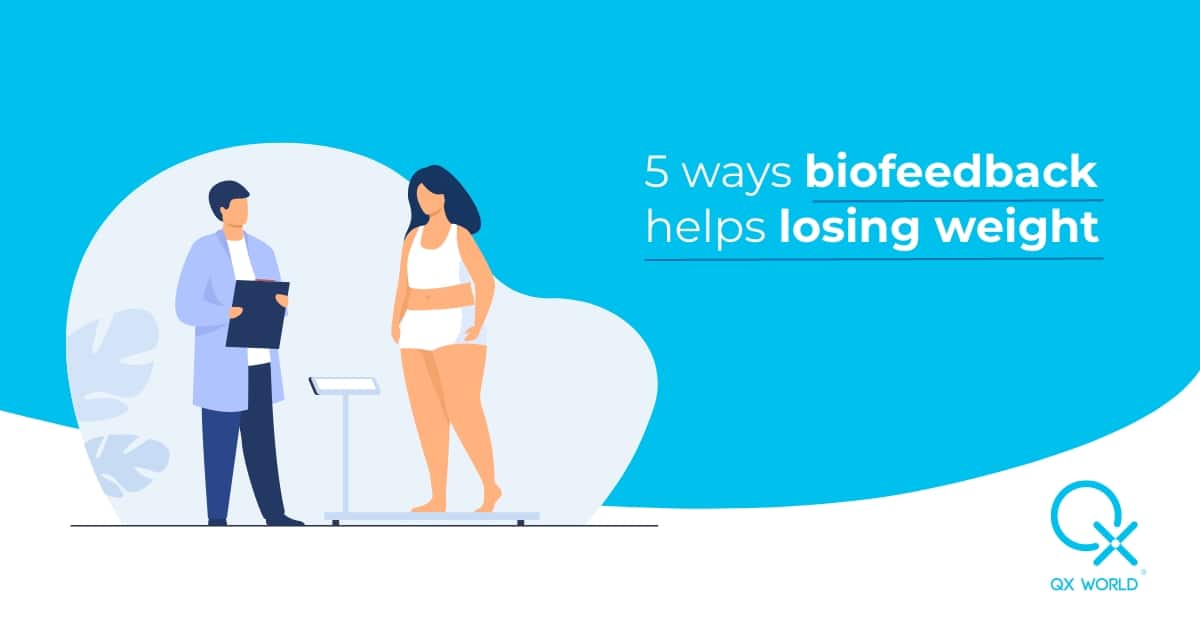
Weight is a very sensitive topic, especially if you set out to lose some, the world can be a tricky place full of unreachable standards, pleasant-sounding shortcuts that are horribly unhealthy, and extreme diets that are almost impossible to keep up in the long run.
Of course, there is the scale in the corner of the bathroom calling to you multiple times a day with the promise of showing you a smaller one, and the threat of showing a slightly bigger number than it did in the morning, and quite frankly, looking at it so often is not helping.
Weight loss and weight gain are complicated, but not in a negative way. There are so many variables coming into play as to why you might be gaining weight and how you can start losing it slowly but surely, step by step.
There are also much better ways to keep track of your progress than obsessively checking the scale. So, without anything further ado, let us get into the depths of how biofeedback helps losing weight.
No, the problem itself is not weight gain. That stems from something else. The question is: what could that be? And the answer might not even be so hard to find as our bodies are constantly reacting to what we do with them, constantly communicating to us what they need and what may make them feel bad.
It’s time to stop disregarding the signs and start listening. By measuring your biofeedback, you are enabled to not only listen, but also to understand, and learn. To see the big picture and adjust the problematic areas.
Stress and tiredness are among the most common causes of weight gain. So, ask yourself some questions:
When you recognize the problem, you can take control of it. QX World’s state of the art biofeedback devices and the OMNIS’ nutrition profiling capabilities help you pinpoint the underlying causes of your weight gain.
Want to know how? Our expert Etelka Anebtawi demonstrates it in her “Nutrition Profile for All” webinar!
As all bodies are different, different things might work for different people. Biofeedback is all about YOUR body. Not bodies in general, but YOUR body, and YOUR weight journey. What’s great is that it allows you to cater to your individual needs. Maybe you tend to overeat when you are feeling stressed.
Or maybe you don’t sleep enough, therefore, you are more frequently hungry. With biofeedback you can start working on these things and keep track of your progress easily, relieving stress and tension, and creating the ideal environment for you to start losing weight.
Our devices offer personalized analyses for our clients unraveling the individual drivers of efficient weight loss in their bodies. Sign up for a for free demo session to discover how!
If you are planning to achieve something permanent, you need to map out maintainable lifestyle changes, for which biofeedback is perfect. By showing you which areas of your life need adjusting you can start making the changes right away.
Food and exercise are a given. It’s important to eat a variety of foods and a variation of all the main nutrients: yes, carbs, fats, and protein are all important, they just need to be balanced and of good quality, that’s all.
Starving yourself for long periods of time just to overeat afterward is nonsense, not to mention that hunger just adds to your stress levels. Making sure that each meal you eat is nutritious can prevent you from getting hungry quickly after eating.
If you struggle with sleeping, you can also try to have your last meal of the day at least 2-3 hours before your sleep time. If your body is not required to digest during the night, you can achieve deeper sleep.
Frequent, sufficient exercise (and not over-exercising) is also something that will help you relieve stress, get better sleep, and therefore lose weight more efficiently.
When you think of keeping track of your progress, you can easily fall into the trap of standing on the scale two times a day. This can be quite discouraging and actually very inaccurate feedback, as weight loss does not happen overnight.
So, instead of always looking at the scale, try checking in with biofeedback we have already mentioned: the quality of your sleep, your energy levels, the frequency and intensity of your hunger, the state of your nerves. Wherever you feel you are still lacking, try and adjust until you feel better.
Keeping track of all these is better feedback than meticulously looking at the scale every morning and every night – as our weight is not a fixed number: it changes through the course of the day and depends on a lot of things.
So, if you weigh a bit more in the evening than you did in the morning that does not mean you gained weight in a day. Maybe step on the scale once a week, and try to find a correlation between what the scale shows and how your body feels. It takes time and patience. Don’t give up.
Learning to understand your body and optimizing your weight to achieve your healthiest state is a lifelong process.
Biofeedback is something to assist you and help you through it with techniques that can help you achieve health and balance mentally and physically.
Losing weight is easier when it’s not in the center of attention, instead it’s one piece of the puzzle that makes up a healthy human body.
We hope you enjoyed this article. Don’t forget to check out our Facebook page if you are interested in more content and our products.
If you have any questions related to the topic of holistic weight loss don’t hesitate to get in touch with us, QX World’s extensive network of experts, knowledge-base and devices will almost certainly have an answer for you.
+1 (989) 681-1063
+1 (856) 322-8589